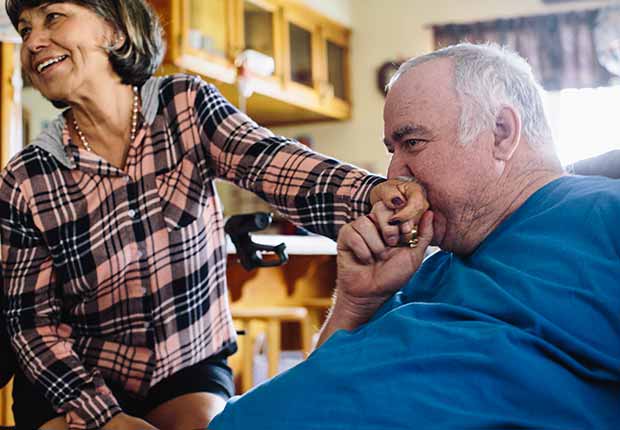AARP Hearing Center

By Ray Huard
Sandy Douglas was the caregiver for her mother, who died in 2014 from Alzheimer’s disease, and is the caregiver for her husband, who suffered a heart attack and work-related injuries in 2011.
“He has heart problems, a collapsed lung, high blood pressure, a back injury—I mean, he’s got everything,” said Douglas, 68, who lives in Coalinga in central California.
Both her mother, who was 98 when she died, and her husband, 56, were in and out of the hospital. Each time they were discharged, Douglas was handed several sheets of paper with directions on how to take care of them.
“Most of the time, the hospital staff doesn’t explain anything,” Douglas said. “They just give me the papers to take home.”
That practice is changing under a new law that passed the Legislature with no opposition in 2015 and took effect at the beginning of this year.
When patients are admitted to a hospital, they now have the right to designate a caregiver and the hospital must note who that is on the patient’s medical charts.
If a patient doesn’t want anyone listed as a caregiver, hospitals must also note that.
Hospitals also must inform the caregiver of discharge plans.
When a patient is discharged, hospitals are required to tell caregivers what continuing care a patient needs, including counseling about a patient’s medication. When appropriate, they also must show caregivers how to perform tasks such as cleaning wounds and moving disabled patients from a wheelchair to a commode or bed.
“In order for a family caregiver to be able to help their loved one as they rehabilitate at home from a hospital in-patient stay, it is important that he or she be trained— not just given the information on a sheet of paper, but given a demonstration,” said Blanca Castro, AARP California advocacy manager.
When longer-term care is required, hospitals must provide information on community resources that can help with referrals.
Wallet cards available
AARP and the California Hospital Association helped draft the law, and AARP has produced wallet cards to distribute to patients and caregivers explaining their rights under the law.
Patricia Blaisdell, the hospital association’s vice president for continuum of care, said, “Our role, at this point, is to provide our members information. Hospitals have always had the responsibility to inform family members.”
The new law highlights that responsibility and clarifies what hospitals should do from now on.
State Sen. Carol Liu (D-La Cañada Flintridge), who authored the legislation, said people complained during a town hall meeting in her district that “they were feeling stress when they were coming out of the hospital. Caregivers didn’t have the proper information as to medical rehabilitation.”
Davis Cracroft, an emergency physician and the medical director of Scripps Mercy Hospital in San Diego, said he understands patients’ concerns.
“I’ve had the experience of being discharged and it can be something that is very confusing,” Cracroft said. “I had just recovered from anesthesia, had pain medicines that were in my system and I was very sleepy. I did not remember anything that they told me.”
Cracroft said Scripps hasn’t had to change its practices to comply with the new law.
“We encourage [patients], whenever possible, to have family members or a patient advocate present at the time of discharge so they can better understand what needs to be done,” Cracroft said.
“That includes use of medications, any kind of task they may help the patient with, or additional resources needed to aid the patient after discharge from our hospital,” he said. “The caregiver can also help to arrange follow-up with a health care provider within a few days of discharge.”
For more information, call the AARP California Caregiving Support Center, 877-333-5885 toll-free or go to the site action.aarp.org/CAcaregivers.
Ray Huard is a freelance writer living in San Diego, Calif.































































